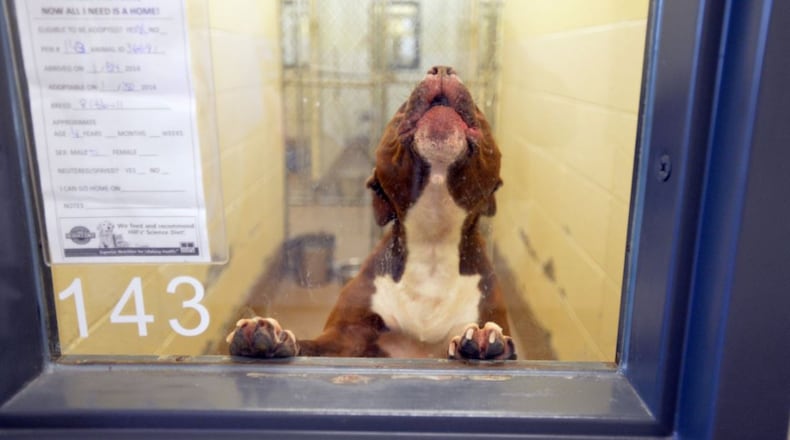On Thursday morning, less than 48 hours after the manager of Gwinnett's animal shelter was found guilty of contempt for euthanizing a court-protected dog, county officials made a big announcement: control of Gwinnett's Animal Welfare and Enforcement Unit would soon be wrested away from the local police department.
The move had been in the works for “several months,” officials said, and had nothing to do with the recent court ruling. In fact, the shelter’s current management team will remain intact even after April 1, when the welfare unit officially becomes part of Gwinnett’s Department of Community Services.
The county touted the opportunities presented by having the shelter, which relies heavily on volunteers, being teamed with a department that specializes in leveraging that type of manpower.
And local animal advocates are on board too — they’ve been lobbying for years to remove law enforcement from the equation.
“We 100 percent respect our police department for the job that they do, and that they’re well trained to do,” said Susan Ruelle, a longtime Gwinnett animal advocate and former shelter volunteer. “But they’re not trained for animal control, nor should they be.”
‘Never been better’
Gwinnett County animal welfare has been under police department control since 1993. Its recent history has been an interesting one.
In May 2012, then-shelter director Lt. Mary Lou Respess retired after an investigation into what one black shelter employee called a "culture of bigotry." Five other shelter employees resigned or were disciplined as part of the investigation.
The same year, an animal task force appointed by Gwinnett’s Board of Commissioners found that the shelter had a shocking euthanasia rate — it killed more than 4,100 animals in 2011 — and recommended that operations either be privatized or placed directly under the guidance of County Administrator Glenn Stephens.
Control of the shelter was not shifted away from the police department, but Respess’ successor, Chip Moore, made major strides in community outreach and euthanasia rates. The shelter killed 771 animals in 2015.
Moore resigned in November of that year, citing personal reasons. The current management team — Curt Harrell, who had a long career in law enforcement elsehwere in metro Atlanta, and Cynthia Wiemann, a former veterinary techinician — took over in March of 2016.
The shelter euthanized 514 animals last year while “saving” more than 5,400. County spokesman Joe Sorenson said those numbers “have never been better.”
‘A natural transition’
Curtis Northrup — Sugar Hill’s mayor pro tem, a member of the 2012 animal task force and former chairman of the county’s animal adivsory council — praised the work the police department has done at the shelter in recent years. But he also commended the county for handing the reins over to community services.
Other local animal advocates were likewise encouraged — if not cautious.
Elizabeth Burgner, co-director of Duluth’s Planned PEThood and another former task force member, said some volunteer and rescue groups have clashed at times with the animal welfare unit’s current leadership team.
The team’s image took a hit on Tuesday as well, when a local judge found Harrell, the shelter’s manager, guilty of contempt and ordered him to pay a $500 fine as part of a lawsuit over a dog euthanized in February. The dog had been labeled “aggressive” but was protected from euthanization by a court order obtained by a woman who wanted to adopt it.
Harrell and Wiemann, the shelter’s assistant director, will continue to lead the shelter when it moves under the umbrella of community services, which also oversees the county’s health and human services; parks and recreation; and voter registration and elections divisions, among others. But Burgner is hoping a departure from the police department may shake things up a bit.
County officials are too.
“The high-quality services and programs provided countywide by the Department of Community Services are a result of the many volunteers and community organizations that partner with us,” director Tina Fleming said, “so it will be a natural transition to coordinate animal welfare services with the staff, volunteers and community groups in Gwinnett.”
GWINNETT ANIMAL SHELTER EUTHANASIA COUNTS
2010: 5,882
2011: 4,128
2012: 3,238
2013: 2,485
2014: 1,233
2015: 771
2016: 514
About the Author
Keep Reading
The Latest
Featured




